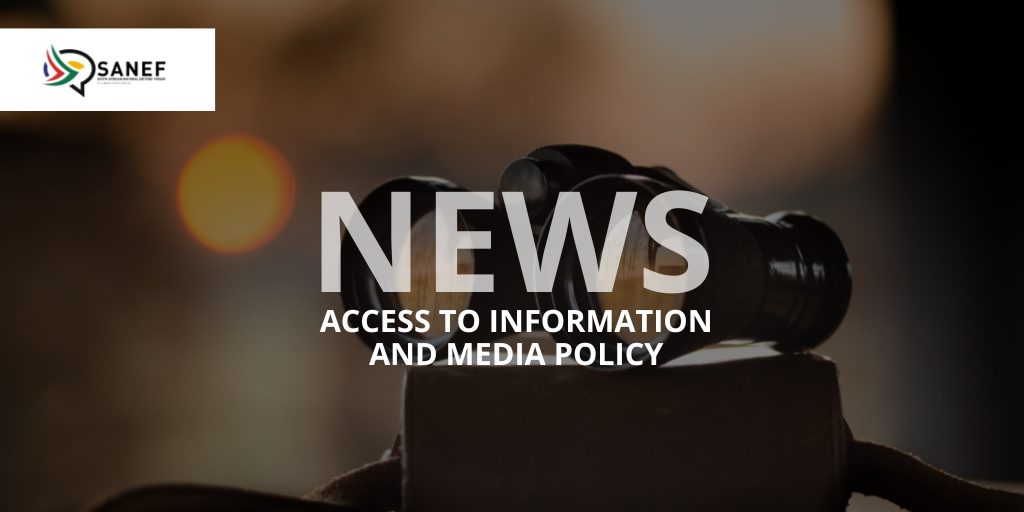SANEF Launches Reporting the Courts Manual and Web Portal
The South African National Editors’ Forum (SANEF) today proudly launches the revised e-version of the Reporting the Courts Manual, following a year-long collaborative public process that brought together the media, the judiciary, and media freedom advocacy stakeholders.
SANEF has also created a special portal https://courtreporting.sanef.org.za for journalists to access this revised edition of SANEF’s 2006 manual of the same name – offering extensive guidance for journalists reporting on South Africa’s law and justice system today. This enormous task was made possible with the assistance of Open Society Foundation for South Africa (OSF-SA).
Due to popular demand, the manual was revised after appeals from various stakeholders and court reporters who argued that the original manual was outdated. Journalists can now access the revised e-version on this portal together with all related training material, put together by the Institute for the Advancement of Journalists (IAJ) who held training webinars last December and in January and February.
Sbu Ngalwa, SANEF’s chairman, said the revised manual would not have been possible without voluntary assistance from the country’s greatest legal minds, including the Justices of the Constitutional Court, who continue to support this initiative. It is the media’s goal to strive to be accurate and balanced when reporting all the courts, commissions of inquiry and related judicial processes, said Ngalwa.
“As journalists, we have the unique responsibility to explain the decisions and processes of our courts, to the public. To do that, we first must understand the court system and how it functions. After all, judges and magistrates have little power outside of the courtroom to explain or unpack their positions. That is why we need the media to play that role, that is public good journalism.”
“As an organisation, we do a lot of collaborative work with training institutions around aspects such as court-reporting principles. We also constantly lobby the Justice Department and the office of the Chief Justice to ensure that journalists have unrestricted access to magistrates and the high courts,” Ngalwa said.
The late Chief Justice Pius Nkonzo Langa wrote the foreword in the first edition where he stated that: “(The) work of the media is not limited to reporting and criticising court decisions. Perhaps the greater challenge for the media is to educate people about their rights and how to enforce them.”
Justice Yvonne Mokgoro wrote the foreword for this revised 2nd edition where she said: “The law being a specialised field of knowledge, this reviewed version of the (Reporting the Courts) manual will continue to enhance the understanding and appreciation of court processes of reporting journalists…To the extent that the COVID-19 pandemic has impacted court processes and the operations of associated entities, the revision will stand journalists in good stead.”
She said the contribution of civil society, including funders, the academia, members of the judiciary and the legal profession has been significant in this effort of rendering the media efficient and effective in its public information role and function. “The demonstrated collaboration between the media and relevant role players in the production of this important manual is thus highly commendable,” Justice Mokgoro wrote.
The first 2006 edition was written by veteran journalist and editor, Kevin Ritchie. media stalwart Gwen Ansell and researcher Nonkululeko Sibambato, now an attorney did the 2022 revisions.
Note to Editors:
- Justice Yvonne Mokgoro was a judge of the South African Constitutional Court from its inception in 1994 until the end of her 15-year term in 2009. Most pertinently for her contribution here, she has served as Chairperson of the Selection Committee for the Press Council of South Africa, which appoints the Press Ombudsperson and members of the Press Appeal Board.
- The South African National Editors’ Forum (SANEF) is a non-profit organisation whose members are editors, senior journalists, and journalism trainers from all areas of the South African media. We are committed to championing South Africa’s hard-won freedom of expression and promoting quality, ethics, and diversity in the South African media. We promote excellence in journalism through fighting for media freedom, writing policy submissions, research and education and training programmes. SANEF is not a union.
For more information please contact:
- Sbu Ngalwa – SANEF Chairperson (073) 404-1415
- Adriaan Basson – SANEF Deputy Chairperson (082) 562-2113
- Monica Laganparsad – Acting Secretary-General (082) 578-6111
- Nwabisa Makunga – Treasurer (082) 555-1972
- Makhudu Sefara – SANEF Acting Media Freedom Chair (079) 177-2134
- Asanda Ngoasheng – Western Cape Convenor – 082 610-9374
- Judy Sandison – SANEF KZN Convenor (082) 571-3334
- Katy Katopodis – SANEF Gauteng Convenor (082) 805-7022
- Chiara Carter – SANEF Eastern Cape Convenor (082) 659-9162
- Reggy Moalusi – SANEF Executive Director (071) 682-3695
Socials
Twitter: @SAEditorsForum
Email: [email protected]
Website: SANEF



